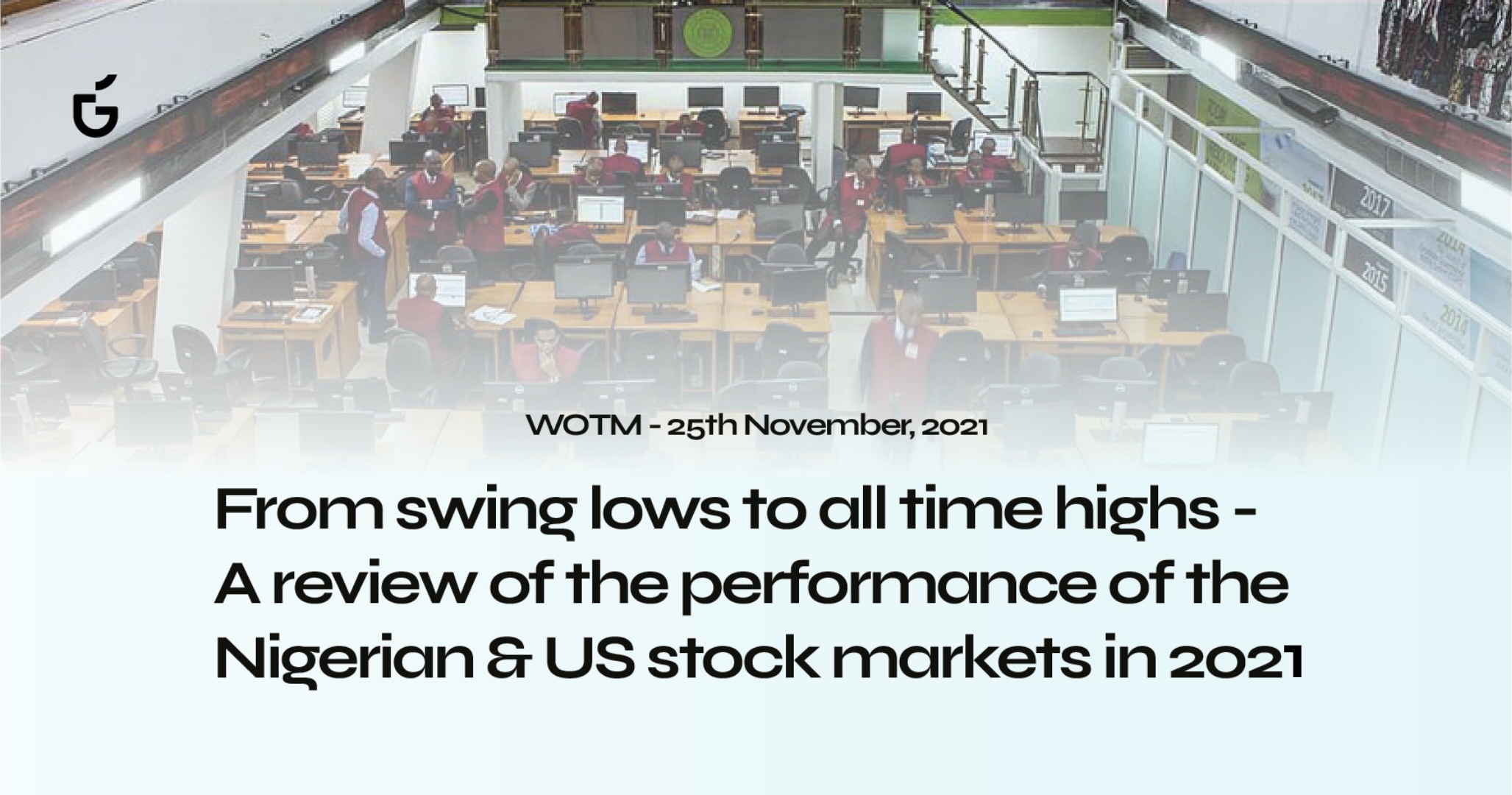 Africa
AfricaUnderstanding how companies are valued – A look into the MainOne acquisition
15 December, 2021
28 October, 2021 | 4 MINS READ
The Story
From traditional assets like stocks to sophisticated assets such as like Non-Fungible Tokens (NFTs), the investment environment in Nigeria is brimming with multiple investment options. Technology trends and an increasing appetite for high yield stable assets have fueled an increase in investment options globally. Along with this trend is an increase in financial education and unfortunately, Ponzi schemes. This has not always been the case, but we’ve watched things unfold for the African millennial, specifically the Nigerian millennial for half a decade and are excited about what’s to come.
Let’s start from the not-so-far beginning
Before 2003, the stock market was the lone player in the Nigerian Capital Market. Savvy investors invested predominantly in 2 assets, stocks and real estate. Most people kept their monies in savings accounts with banks, while others depended on the thrift savings system (Ajo or Esusu).
In the year 2000, the Debt Management Office (DMO) was established to track the issue of government bonds and treasury bills and also generate domestic debt reports for internal & external stakeholders. By 2003, Nigeria issued its first debt/fixed income instrument.
This move, expanded the scope of the Nigerian capital market, increased the number of participants in the market and gave the government & corporates an avenue to raise funds for capital projects.
The launch of the Nigerian debt market and the privatization of a number of government agencies in the early 2000s drew a lot of attention to the Nigerian capital market. Corporates and investors alike identified the opportunities in the market and came in, to position for profit in the market. This was the beginning of the journey to the crash of the Nigerian stock market in 2008.
Buoyant global financial markets, the local listing of Nigerian banks and other corporates on the Nigerian Stock Exchange, and a burgeoning domestic debt market led to significant growth of the Nigerian capital market in the early 2000s. Between 2003 & 2007, the market capitalization of the Nigerian stock market grew by 870%, moving from N1.3trillion to N13.2trillion.
These gains were however wiped away in 2008/2009, when the market due to the global financial crisis and the many imperfections of the Nigerian capital market, crashed. The heavy losses of 2008/2009 in the Nigerian stock market scarred a lot of investors and kept them away from the market. There has been a lot of restructuring of the market since the 2008/2009 downturn, but the market has not been the same. There hasn’t been a repeat of the year on year rallying of the market we had pre-market crash in 2008.
The emergence of the millennial investors – hard lessons learnt
The average age of investors in the Nigerian stock market is 56 pre-2008. When the market become buoyant, young people (Ages 25-40) got interested and started to invest in the stock market. The buoyancy did not last for long as most of them got their fingers burnt when the market crashed.
These millennials continued to grow in their careers and in purchasing power. Along with attractive salaries came the need to invest. However, most of them refused to go back to the capital market post 2008 because of the losses they earned during the market crash. Some of these millennials also got handed stock portfolios from their parents that were worth very little after the market crash.
To test the investment waters, most millennials started off their investment journey by investing in treasury bills and money market mutual funds. Interest rates on treasury bills at the beginning of 2012 was ~14%-15% however, by the end of the year, rates dropped to 11%. Rates have continued to drop and are currently at 7.5% for 364-day bills in October 2021. Compared to the current inflation rate at 16.6%, these rates offer a negative investment growth rate.
As the economy continues to evolve, millennials continue to seek more investment options that offer higher ROI than traditional investment options. This hunger for high returns has led to them seeking opportunities in alternative assets. However, in the quest for higher returns, most became victims of wonder banks and Ponzi schemes. We believe the solution to this is comprehensive financial education and community which we provide in the TGI club.
The advent of Technology in the investment space
On a global scale, financial assets are at the forefront of the digital evolution today. In the last 5 years, advancement in technology has enabled easy access to financial assets like stocks & bonds. A new type of currency (cryptocurrency) has emerged from the use of technology in finance.
In Nigeria, sectors like agriculture took advantage of technology to crowdfund agricultural projects and pay investors a healthy return on investment. With access to the US stock market via stock apps came the opportunity to own stocks in businesses listed on the New York stock exchange and participate In global business trends. All of this has contributed to innovation in the local investment space in Nigeria.
These innovations did not come without hitches. Some of the crowdfunded Agriculture projects emerged as Ponzi schemes while a number of the projects simply failed due to the inherent risky nature of the Agriculture business. We also saw regulators step in to wield the big stick on the operations of some financial technology companies, especially the crypto exchanges and stock apps.
While we’ve seen significant growth in the Information & Communications Technology (ICT) sector of the Nigerian economy in the past decade. (In Q2 2021, the ICT sector contributed 17.83% to Nigeria’s Gross Domestic Product (GDP), way more than the 7.42% contributed by the oil sector), the overall economy continues to experience slow growth.
In spite of the growth in ICT and financial technology (fin-tech – economic opportunity) and how it has enabled access to more investment options, young mid-income individuals in Nigeria remain more impoverished than their parents were at the same age. They deal with issues such as inflation and frequent currency devaluation. Their rate of savings is lower, rate of asset ownership low, and overall trust for traditional wealth creation channels at an all-time low. TGI club solves this problem by providing a platform for collaborative investment in multiple investment options such as Eurobonds, real estate and Venture Capital funds.
Investing through Collaboration
For the average African young person (Millennial or GenZ), collaboration is a thing. Collaborating to invest is the activity of pooling resources together to take advantage of investment opportunities as a group that individuals might not be able to access due to low financial power or lack of access to information. This is the basis of the formation of most investment clubs and this is what we do at TGI Club. It is the power of individual investors to create wealth by coming together as one body to invest.
There are many advantages of collaborating to invest, some of which include:
Financial Education: Members of The TGI club are educated and get to co-learn about assets classes and how to position for profit with each asset class. They take investment decisions based on their financial capabilities and the stage of life in which they are in. As a result of taking advantage of the power of many, we get access to timely information, negotiate and make informed investment decisions.
Due Diligence: Investment opportunities curated in The TGI club go through a due diligence process that ensures investors funds are invested in credible investment opportunities. Though there is no investment opportunity without risk, the risk exposure is limited when the opportunities are credible.
Democratizing Opportunities: There are investment opportunities that are only accessible to High Net-worth Individuals (HNIs). With the power of collaborative investments, retail investors are able to take advantage of these opportunities. In TGI Club, we collaborate in a way that facilitates collaborating to invest in opportunities like Eurobonds, Venture Capital Funds and other investment opportunities that are usually available only to HNIs.
Curating investment opportunities that grow businesses
One of our core operations at the TGI Club involves curating investment opportunities. We do this with a deep understanding of the investment needs of our target demographic, the current economic environment, and the needs of our investment partners.
On the flip side, funding is a major challenge for most businesses in Nigeria and Africa at large. We see this as an opportunity as well and curate investment opportunities that enable members of TGI Club provide the necessary funding for businesses while earning a return on their investment in these businesses.
This is our way of enabling businesses to grow and contribute to the growth of the local economy. Some of the businesses we are in partnership with experienced significant growth in revenue in the years we’ve partnered with them.
Beyond investing, building investment portfolios
At the TGI Club, we know that beyond investing, it is important that we help members of the club build diversified investment portfolios. We understand their preference for high yield investment opportunities, but we also see the importance of a balanced portfolio that consists of income generating stable assets.
We encourage members of TGI Club to not only invest in high yield debt instruments but also look to owning assets that increase their net worth. This we do by curating investment opportunities that help members of the club build investment portfolios with a mix of different assets, taking into cognizance the investing environment.
Defining the future of Africa with the power of collaborative investment
Africa, as a continent, lags behind the rest of the world on a number of things. Most African countries in one way or the other depend on colonial masters and the western world for survival as they are heavily indebted to them. Countries like Nigeria, Ghana and Kenya export rich natural resources to developed countries and buy these resources back as processed goods.
Collaborative investment groups can change the negative narrative around African. Pooling together resources to invest in Africa can help African countries break free from the leash of indebtedness that western countries use to hold them down.
With collaborative investment groups, we can invest in businesses that will produce exportable value add products, we can create infrastructure funds, that will cater to the infrastructure deficit in most African countries, we can influence government policies and shape the future of Africa.
As a collaborative investment group, in its 3+ years of existence and with over 2,000 members, the TGI Club has mobilized over $21million (N8.6billion @ the official exchange rate of N410/$) in investments in the capital market, consumer lending, Agro-finance, real estate and venture capital.
We’re currently taking applications from prospective members to join the TGI Club, send an email to Lola, hello@thegreeninvestmentclub.com.= to learn how to apply to join us as we continue to help more people build diversified investment portfolios.
 Africa
Africa15 December, 2021
 Africa
Africa09 December, 2021
Join the biggest
investment club in Nigeria.